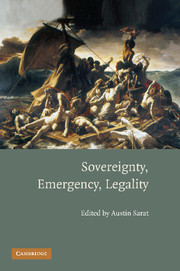Book contents
- Frontmatter
- Contents
- Contributors
- Acknowledgments
- Introduction: Toward New Conceptions of the Relationship of Law and Sovereignty under Conditions of Emergency
- 1 The “Organic Law” of Ex Parte Milligan
- Comment on Chapter 1: David Dyzenhaus, “The ‘Organic Law’ of Ex Parte Milligan”
- 2 Emergency, Legality, Sovereignty: Birmingham, 1963
- Comment on Chapter 2: “Order” in the Court
- 3 The Banality of Emergency: On the Time and Space of “Political Necessity”
- Comment on Chapter 3: Emergencies, Body Parts and Price Gouging
- 4 The Racial Sovereign
- Comment on Chapter 4: Toward a Nonracial Sovereign
- 5 Should Constitutional Democracies Redefine Emergencies and the Legal Regimes Suitable for Them?
- Comment on Chapter 5
- Index
Comment on Chapter 3: Emergencies, Body Parts and Price Gouging
Published online by Cambridge University Press: 07 May 2010
- Frontmatter
- Contents
- Contributors
- Acknowledgments
- Introduction: Toward New Conceptions of the Relationship of Law and Sovereignty under Conditions of Emergency
- 1 The “Organic Law” of Ex Parte Milligan
- Comment on Chapter 1: David Dyzenhaus, “The ‘Organic Law’ of Ex Parte Milligan”
- 2 Emergency, Legality, Sovereignty: Birmingham, 1963
- Comment on Chapter 2: “Order” in the Court
- 3 The Banality of Emergency: On the Time and Space of “Political Necessity”
- Comment on Chapter 3: Emergencies, Body Parts and Price Gouging
- 4 The Racial Sovereign
- Comment on Chapter 4: Toward a Nonracial Sovereign
- 5 Should Constitutional Democracies Redefine Emergencies and the Legal Regimes Suitable for Them?
- Comment on Chapter 5
- Index
Summary
Introduction
The study of emergency has received much attention from political theorists such as Carl Schmitt, Michel Foucault, and Giorgio Agambden. Relying on the realms of philosophy, theology, and morality, these scholars and their contemporary counterparts have focused on whether acts of the sovereign in times of emergency lie “inside” the law (i.e., whether they are subject to scrutiny) or “outside” the law. Many of those who place states' actions in emergencies outside the law, like Schmitt, analogize the power of the sovereign to the miracle in theology. “Just as an omnipotent God performs miracles by suspending the laws of nature,” the argument goes, “the political sovereign suspends positive law.” Some analogize “legal exceptions” in times of emergency to another religious concept: the Christian pastorate. Foucault, for example, compares the sovereign's function to a relation between “the pastor [and] his fl ock.” Others support a middle ground. They propose the adoption of a separate body of law that would deal with emergencies. Under the latter's proposal, once a declaration of emergency has been issued, this unique body of law would provide the executive with special authorities that would trump “normal law.” Proponents of this approach place emergencies “outside” of “normal law” but still inside the legal framework.
This article, however, takes a different approach. Rather than resorting to theology or philosophy, it relies on the study of economics to analyze two types of emergencies. I refer to the first type of emergency as “public emergencies.” Public emergencies require the sovereign to modify or suspend the entire existing order.
- Type
- Chapter
- Information
- Sovereignty, Emergency, Legality , pp. 165 - 181Publisher: Cambridge University PressPrint publication year: 2010



